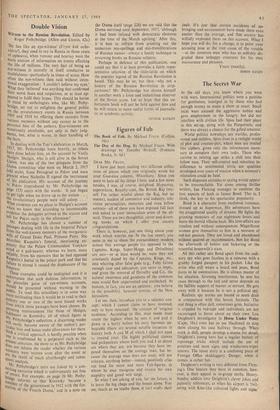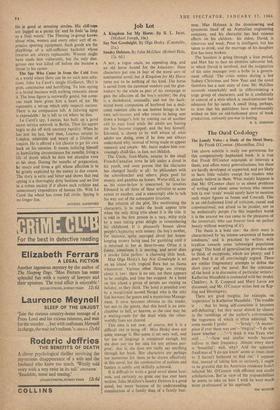The Secret War
IN the old days, you knew where you were with wars. International politics were a pastime for gentlemen, indulged in by those who had
enough money to make a show at court. Small local wars amused the aggressive nobles and gave employment to the hungry, but did not interfere with civilian life. Spies had their place in this set-up, along with the Pimpernels; and
•
there was always a chance for the gifted amateur.
World politics nowadays are warlike, profes- sional and ruthless. Spies lives in a twilight world of plot and counter-plot, where men are treated like ciphers, given only the information neces- sary to complete their own tasks. Those who survive to retiring age strike a chill into their fellow men. Their self-control and relentless in- difference to sentimental trivia are qualities developed over years of tension when a moment's relaxation could be fatal.
Such disparate attitudes to spying would appear to be irreconcilable. Yet alone among thriller writers, Ian Fleming manages to combine the best aspects of both in James Bond. This is, I think, the key to his spectacular popularity.
Bond is a character from mediaeval romance, dressed up as Superman. His adventures have the exaggerated quality of dreams. He fights the grinning monsters of our nightmare hours and beats the horrid villains back. His love-affairs are timeless and without consequences. Magnificent women give themselves to him in a moment of red-hot passion. They are loved and abandoned without quarrel or recrimination. Not for Bond the aftermath of babies and bickering or the resentful housewife's stare.
All this rather sets Bond apart from the ordi- nary spy who goes faceless in a raincoat with a grubby forged passport in his pocket. Like the artist who still wears a beard and jeans, Bond dares to be 'ostentatious. He is always master of his situation. Scorning interference, he sees his cases through to the end and never depends on the fallible support of master or servant. He gets away with it because he is not a political spy.
Realistic spy stories are bound to seem drab in comparison with this heroic formula. The real thing is often dull, sometimes grim. Initiative is crippled by red-tape and individuals are not encouraged to ferret about on their own. Len Deighton's investigator in Horse Under Water (Cape, 16s.) even has to use blackmail to stop them closing his case halfway through. When work is dull, people develop a mania for detail. Deighton's young hero has a regular battery of espionage tricks which include the use of potatoes and neon signs and windscreen-wiper motors. The latest story is a confusing piece of Foreign Office skulduggery. Danger, when it comes, is rather fun.
Deighton's writing is very different from Flem- ing's. One feature they have in common, how- ever, is their appeal to in-group snobs. Heavy- Sunday addicts love Deighton's clever jokes and painterly references, as when his airport is 'twit- tering with Klee-like coloured lights and signs.'
He is good at arresting similes. His cliff-tops are 'jagged as a picnic tin' and he feels 'as limp as a Dali watch.' The Fleming in-group knows about wine, women and every other sort of ex- pensive sporting equipment. Such goods are the playthings of a self-sufficient bachelor whose luxuries are always replaceable. Women might have made him vulnerable, but the only dan- gerous one was killed off before she became a threat to his career.
The Spy Who Came in from the Cold lives in a world where there can be no such neat solu- tions. John Le Carres tangle (Gollancz, 18s.) is grim, continuous and horrifying. To him spying is a brutal business with nothing romantic about it. The boss figure is outwardly genial, but some- one must have given him a heart of ice. He represents a set-up which only respects success. There is no compassion left. A faltering agent is expendable: he is left to rot where he dies.
Le Carre's spy, Loamas, has built up a good secret service network in Berlin. Then his agents begin to die off with uncanny rapidity. When he has lost his last, best man, Loamas returns to London, miserable and weary of a lifetime of tension. He is offered a last chance to get his own back on his enemies. It means isolating himself in humiliating circumstances for months, living a life of deceit which he dare not abandon even in his sleep. During the months of preparation, he meets and loves a girl whose affection is to be grimly exploited by the enemy in due course. The story is eerie and bitter and shows that real spying is a thoroughly dirty business and we live in a rotten society if it allows such ruthless and unnecessary expenditure of human life. With Le Carrd the wheel has come full circle. Spying is no longer fun.
ANTONIA SANDFORD



































 Previous page
Previous page